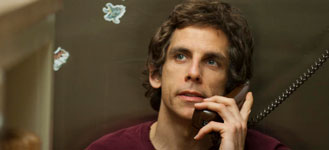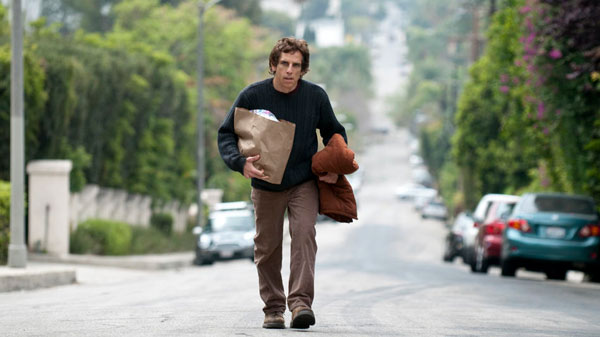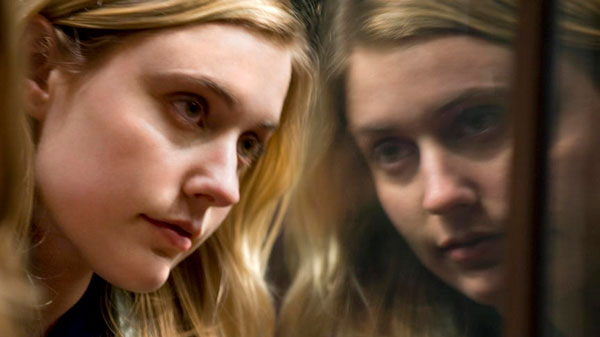Greenberg (Focus Features)
The Stab: A carefully constructed case study lacking the resonance and perspective to feel worthwhile. Off-putting more than engaging. Substance feels sparse while pretension abounds.
The Great White Oblivion. That particularly insidious mythological kingdom imagined by Hollywood, where the sky is as white as the skin is fair, and society reverberates in an affluent bubble—blind to the real and functioning world.
With Greenberg, writer and director Noah Baumbach takes us to perhaps the most insufferable expanse of the Oblivion. To be dysfunctional is to be trendy, and characters obsess over the minutiae in their pursuit of a deeper meaning.
They insist upon struggling greatly, and occasionally, they even appear to do so. But their perspective is so limited, so skewed, that hardship is generally a foreign concept to their experience.
The problem is that Greenberg itself functions entirely within the Oblivion, and so every improbable interaction, every ponderous swath of dialogue, every aphoristic absurdity, every exercise in frivolity—each is portrayed as logical and legitimate.
In the Oblivion, and in Greenberg, life is a series of privileged diversions: restaurant rendezvous, bar visits, poolside gatherings, house parties, late nights, and early mornings—with alcohol as ubiquitous as the air and, somehow, extra time to spare. No one bats an eye, except to revel in misery and self-pity.
Diversity exists solely to enliven or embolden the actualization process for the patriciate.
Hegemony propagates like breeding bunnies.
In Greenberg, Ben Stiller plays Roger Greenberg, our titled man without a plan recovering from a nervous breakdown while house-sitting for his brother in Los Angeles. The film sees Roger considering his past, present, and future as he readies to re-enter the day-to-day.
Stiller tries to keep it straight-faced and morose, and for the most part, he is successful—if unremarkable. Even so, he can’t quite fully shake the funny man, wincing and twisting his body as he doggy-paddles across the pool. A tepid laugh—even as it contradicts the film’s own intentions.
Greenberg reconnects with his old buddy Ivan (Rhys Ifans), whose marriage is unraveling. Of course, they were once in a band together, with aspirations and abilities set for stardom. Because who can’t relate to that—to life getting in the way of fame and fortune?
Only in the Oblivion.
Meanwhile, Greta Gerwig plays Florence, the assistant to Roger’s brother (again, a fully relatable concept, no?). Florence is a wandering soul of her own and, tasked with checking in on her boss’ brother, begins an unusual relationship with Roger.
Gerwig is gentle and endearing, and as far as existential ramblings go, hers are the most tolerable. But Baumbach puts her every motion under intense focus, suffocating most human tendencies and fetishizing her into a wounded nymph.
Roger and Florence engage in a desperate game of musical chairs, coming together and moving apart, unsure of or uncommitted to how they feel or what they want. Watching their quietly volatile courtship would feel cumbersome even if they were likable. Needless to say, there’s little compulsion to become invested.
Jennifer Jason-Leigh makes a brief appearance as Greenberg’s former flame Beth. She imparts a refreshing luminance and effortless honesty even as Beth oddly enables Roger’s inaptness. Leigh’s refusal to be fussy counters well her director’s obsessive insistence.
Indeed, Baumbach wields his camera like a microscope: every frame a slide used to examine every inch of every moment. His precision is admirable, and the film is technically proficient. But as such a scientific study, Greenberg reveals little that is interesting, enlightening, or inspiring. As a piece of storytelling, it isn’t particularly challenging, entertaining, or convincing. Purpose feels as lost to the film as it does to its characters.
Instead, Baumbach carefully stacks images on top of one another and then plunges downward with his scalpel and scope. But through his magnified lens, all that can be seen are other people looking back through their own microscopes: an unending spiral of aimless scrutiny—a relentless quest for truth in nothing.
If only Greenberg weren’t kidding itself that something substantial might be there. If only it weren’t trapped in the Great White Oblivion.




Written & Directed by Noah Baumbach.
Rated R for some strong sexuality, drug use, and language.
Runtime is 1 hour, 47 minutes.
Showtimes @ The Charles» Watch the Trailer» Visit the Website»







Leave a Reply
You must be logged in to post a comment.